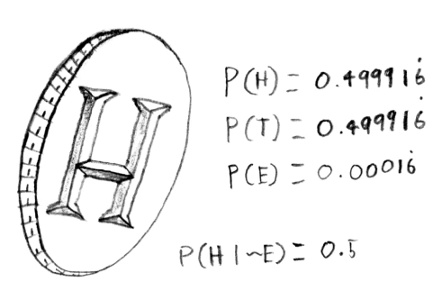Deconditioning

Something I find really fascinating in statistics is the relationship between conditional and unconditional probability. Roughly: conditional probability is the chance that a thing happens assuming something else happens, unconditional probability is the chance that the thing happens at all. So the unconditional probability of "it's going to rain" is much lower than the conditional probability of "it's going to rain given that it's cloudy and humid and I'm in Singapore in the afternoon". You can get much more specific predictions when you can assume a lot than when you have to assume nothing.
But the obvious question is: how can you assume nothing? Surely you're always making some kind of assumptions. And that is exactly the thing I find fascinating: conditional probabilities work exactly the same as unconditional probabilities when you're inside the condition, so there's no way to tell if a probability is conditional or not. You just define some boundary and say "that's the unconditional probability". It's totally arbitrary, though; there could always be more conditions that aren't part of your model. Although you learn unconditional probabilities first, they're actually the weird special case. In real life, everything is conditional.
Which leads to an interesting idea. There are lots of ways that we condition our understanding of the world but treat it as unconditional. Someone asks "what are you doing tomorrow?" and you say "probably just watching TV", and leave off the "...unless my TV catches fire or I'm abducted by aliens". Since those probabilities are so remote, it's easier to just condition on them not happening. That's pretty sensible, but there are also less sensible reasons you might condition on something. Often we keep assumptions even after the reasons to make them have changed. Worse still, sometimes we wilfully hold on to an assumption for ideological or egotistical reasons.
This matters because it's easy to end up stuck in some paradoxical situation where none of the options are acceptable but you have to choose one of them. Sometimes that's genuinely true, and quite distressing, but often it's just that there are options you've conditioned away. You could be having trouble finding a place you can afford because you've conditioned on living in a city, when the country would work just as well. Or unhappy in work or a relationship because you've conditioned on staying in it, when really it would be a better idea to go. It's not even that you examine those options and discard them, it's that you don't even consider them because you've conditioned yourself into a universe where they don't exist.
So I think an important exercise when faced with a difficult situation is deconditioning, the process of examining and challenging the conditions that restrict your decisions and understanding. That's easier said than done, but I've found that just thinking "what am I taking for granted about this decision" can often be enough to dislodge at least the top layer of assumptions and allow you to find a solution in an otherwise impossible situation.
Of course, the more you decondition, the harder and more complex your decisions get, but also the more flexibility and breadth you have in your solutions. In theory, if you could get rid of every assumption, you would finally reach the true unconditional probability where you simultaneously consider every possible thing, no matter how remote or unlikely. If that's even possible, it would certainly require more processing than any human could muster.
Perhaps the best we can hope for then is to decondition a little bit, and do our best to make our conditional probabilities unbiased; rule out probabilities that are unlikely, not unpalatable.